Enter content here Two Macedonian army MI-8 helicopters strike the village of Vakcince, about 24 miles northeast from the capital Skopje, May 7, 2001. The Macedonian government come under the combined pressure of NATO and the European Union on Monday to forgo the imposition of sweeping war powers. (Oleg Popov/Reuters) PRESIDENT TRAJKOVSKI DECIDES WHETHER STATE OF WAR WILL BE DECLARED. MIA Skopje, May 7 (MIA) - "The continuous terrorist attacks in the past 70 days, which directly jeopardize Macedonian territorial integrity and sovereignty, and the security of Macedonian security forces and all of its citizens, have raised the possibility of suggesting the Macedonian Parliament to declare a state of war" Antonio Milososki, spokesperson of the Macedonian Government said on Monday press conference.
Milososki said that the terrorists have been and are still active in the region from Tetovo, and the nearby villages close to the Kosovo part of the border between Macedonia and Yugoslavia, all the way to the Kumanovo region, and all this puts Macedonia in a position to defend itself from a foreign aggression. According to Milososki, the decision of declaring a state of war is entirely in the hands of the Macedonian President and Supreme Commander of the Macedonian Army, Boris Trajkovski who, after consulting military experts and leaders of political parties, should decide whether he would submit the proposal to the Macedonian Parliament.
Gjorgji Trendafilov, spokesperson of the Macedonian Defense Ministry, denied the speculations of alleged Macedonian soldiers killed in an ambush, as well as the misinformation that damage has been done to Macedonian Army's equipment. The Macedonian security forces started their operation, which is still in progress, in 8:15, and destroyed terrorist positions around Slupcane and Vaksince. Around 13:00 the terrorists abandoned several positions and tried to retreat to the north, but the Macedonian Army units thwarted all such attempts.
Stevo Pendarovski, spokesperson of the Macedonian Interior Ministry, informed that on Sunday, around 16:30, near the checkpoint Sipkovica, terrorists fired four times, most probably out of hand grenade launchers. The shots came from the general direction of the village of Brodec. Ten minutes later, the terrorist fired again, and this time the Macedonian security forces returned fire.
Pendarovski informed that Monday, from 7:00 to 14:00, 483 citizens of Albanian nationality, of whom 100 men, 165 women, and 218 children left for Kosovo at the border crossing Blace. He said that citizens of Cerkeze, Nikistani, and Radusa continued to leave the country for Kosovo with the same frequency. He denied the rumors that a helicopter crashed, and informed that around 15:00 a KFOR helicopter due to certain problems landed near the dam "Kalimanci", Kocani.
Colonel Blagoja Markovski, spokesperson of the Macedonian Army, briefed the journalists on the course of the Monday operation of Macedonian security forces. Sunday night, around 22:00 terrorists from Vaksince opened fire at positions of the Macedonian Army, and the army returned fire. Monday morning, around 5:30, terrorists from Lojane started to shoot at the Macedonian Army, but the Macedonian soldiers returned fire, destroyed the stronghold and around 20 terrorists were killed. The operation continued in the direction of Opae, where there was low resistance. The most mass and severe attack of the terrorists happened near Slupcane at 13:00. The Macedonian security forces opened fire from both sides of the road to Vaksince, and advanced to the entrance of the village of Slupcane. Markovski informed that the Macedonian Army couldn't operate in Lojane, because there are 50-60 terrorists that hold the local population hostage. "There is still unconfirmed information that 20 terrorists left Lojane and headed for Kosovo" Markovski said.
Asked whether the captured Macedonian soldier is alive, Trendafilov answered that the Army has knowledge that the soldier is alive, but that this information could not be confirmed with certainty. 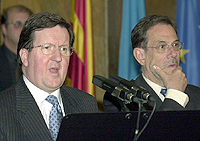 ROBERTSON-SOLANA: COMPLETE CEASE OF VIOLENCE IN MACEDONIA. MIA NATO Secretary General George Robertson and EU High Representative of Common Foreign and Security Policy Javier Solana met today with President Boris Trajkovski, Prime Minister Ljubcho Georgievski and with the leaders of the political parties in Macedonia.
"This is a time of true crisis. Macedonia is on the edge of a chasm. Our note to all citizens is that they have to step back from this edge before a real catastrophe happens," Robertson stated.
He added that this is the time when the Macedonian democratic institutions must show their power and the international community will not allow these democratic institutions to be undermined by a group of killers.
"They have no other goal but to destroy the democratic Macedonia," Robertson said, expressing support to the idea for establishment of wider governmental coalition, which will include all political elements in the country.
"Progress has been already achieved in regard to the reforms and that process must continue. This country may be on the edge of an abyss, but I think there is enough reason and political courage to stop the violence which may cause new bloodbath on the Balkans," NATO Secretary General said.
He underlined the progress achieved by the postponement of the census, consensus about the third television channel for the minorities, and about the Tetovo University.
"The dialogue and not confrontation is the way out for this country. NATO and the international community completely support the democratic institutions in Macedonia," he stressed.
Robertson reported that Monday afternoon Commander of NATO South Wing Admiral James Ellis will meet with Chief of the Macedonian Army General Staff General Jovan Andreevski. The meeting will be focused on finding a way for better coordination of the activities of the two sides.
"I appeal to all those who use violence instead of political means to lay down their arms and to use the political process," Robertson underlined, adding that NATO will aggressively monitor the Kosovo border and will maintain the close cooperation with the Macedonian Army.
EU High Representative Javier Solana estimated last evening meeting with President Trajkovski as "very productive." At the meeting he presented the support from the 15 EU members to Macedonias efforts to defend the territorial integrity and sovereignty.
He reported that today he would continue the meetings with the leaders of the political parties in Macedonia.
"The dialogue is the only way for the future of this country. This is the moment when all political parties and their leaders should reach a consensus," Solana stressed.
"We want to see complete cease of fire and violence. We are in a democratic country with democratic institutions and democratic parliament. Those who use force and violence against the Macedonian Army and those who use the civilians as a human shield should stop doing that and the reform process should continue," NATO Secretary General Robertson stated.
Asked whether Macedonia should become a model for ethnic co-living, Roberson said: "this country was an example of how different ethnic groups can live together despite the ethnic constellation in the region."
EU High Representative Solana met today at the Skopje airport with Chief of the UNMIK Mission Hans Haeckerrup who departed to New York, where he and UN Secretary General Kofi Annan will analyse the situation in Kosovo. 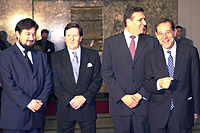 PRESIDENT TRAJKOVSKI, PM GEORGIEVSKI MEET SOLANA AND ROBERTSON. MIA Macedonian President Boris Trajkovski and Prime Minister Ljubcho Georgievski had a meeting Monday with NATO Secretary General George Robertson and EU High Representative for Foreign and Security Policy Javier Solana, focused on the situation in Macedonia.
Expressing satisfaction with the cooperation with NATO and KFOR, Trajkovski underlined the commitment of Macedonian top officials to keep on with the political process as the most appropriate way for full isolation of terrorist and extremist groups, but also the readiness to military response to all of those who are threatening the country's integrity and peace of citizens.
In that respect, Trajkovski has reiterated that the problems Macedonia is facing originate from Kosovo, adding that the international community should deal with the issue in compliance with the UN Security Council Resolution 1244.
Georgievski informed the guests about the political and security situation in the country, stressing that terrorist formations are fighting for Macedonia's territory, which would not be allowed.
Robertson and Solana reaffirmed the strong NATO and EU support of Macedonia's territorial integrity and sovereignty, condemning the terrorist acts of violence on the Macedonian territory.
They also said that terrorist aim was to stop the intensified political dialogue and reforms in the country. Mr. Robertson said NATO would grant additional military assistance to Macedonia.
Chief of Staff of the Macedonian Army Jovan Andrevski and NATO Commander of for Southern Europe James Ellis also attended the meeting.
Later, they hold separate meeting to discuss further cooperation between the Macedonian Army and NATO.  CHIEF OF STAFF OF MACEDONIAN ARMY ANDREEVSKI MEETS ADMIRAL ELLIS. MIA Chief of Staff of the Macedonian Army Lieutenant General Jovan Andreevski met Admiral Ellis, Commander-in-Chief of Allied Forces Southern Europe to discuss details of military cooperation and coordination between NATO forces and Macedonian military and border police forces.
They agreed to continued commitment to close cooperation and exchange of information at the tactical and operational levels, and a program of visits and interactions between Macedonian military and Allied Forces South and KFOR leadership.
Admiral Ellis identified Major General Lange as his personal representative in Macedonia and as the senior military representative to the NATO Coordination and Cooperation Center in Skopje. Macedonia 'on brink of abyss' BBC The Macedonian army has renewed its bombardment. Nato Secretary-General George Robertson has warned that Macedonia is on the "brink of an abyss".
Lord Robertson, who is in Macedonia with EU defence chief Javier Solana for talks with the country's leaders, also condemned ethnic Albanian rebels as "murderous thugs".
The main Albanian political party in Macedonia warned on Monday that it would leave the governing coalition if plans to declare a state of war on rebel ethnic Albanians go ahead.
The Macedonian parliament will vote on the proposed declaration on Tuesday, which would give the government and security forces more freedom to deal with the rebels who are fighting in large areas of Macedonia's northern border region.
Macedonian forces have continued their bombardment of rebel Albanian positions near the town of Kumanovo.
Villages attacked
Helicopter gunships focused their attacks on the village of Slupcane - one of five villages held by ethnic Albanian gunmen.
Heavy calibre mortars and tank fire were also being used in the attacks.
The BBC's Nick Wood said although machine guns could be heard intermittently, there did not appear to be any return fire from the rebels.
Nato's Lord Robertson praised the Macedonian Government's firm stance against the guerrillas, and issued his strongest condemnation of them yet.
He called the rebels "a bunch of murderous thugs whose objective is to destroy a democratic Macedonia and who are using civilians as human shields" in a cynical bid to provoke "another Balkan bloodbath". 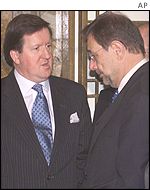 George Robertson and Javier Solana: want to avoid war declaration. But international diplomats are keen to avoid an official declaration of a state of war for fear of alienating more of its ethnic Albanians who make up nearly one-third of the population.
This fear was confirmed on Monday by Arben Xhaferi, head of the Democratic Party of Alabanians.
"We are against the tendency to militarise the state. If they proclaim a state of war, we do not want to stay in the coalition," he said.
EU urges rethink
"Rather than talk about a state of war, we should discuss a state of peace," said Mr Solana.
A state of war hands would give enhanced powers to the president and the military. Its provisions would allow for: Presidential rule by decree Fewer restraints on the army The banning of demonstrations A nationwide curfew The sealing the country's borders A statement by the president's office over the weekend said the move was justified because "terrorist groups" had been "endangering and breaching the territorial integrity and sovereignty of Macedonia".
Ethnic Albanians have long campaigned for greater rights in Macedonia, arguing that they are treated as second-class citizens.
The ethnic Albanian guerrillas say they support these aspirations for equality within Macedonia. But most observers believe the guerrillas really want independence within a greater Albania. 'Human shield' claim backed. Telegraph By Christian Jennings in Recica.
THE Red Cross confirmed yesterday that civilians are being held against their will by extremist Albanian rebels in villages under heavy shellfire from the Macedonian army.
"One reason why people are staying in these villages is a form of intimidation," said Annick Bouvier, a spokesman for the International Committee of the Red Cross information officer, in the Macedonian capital, Skopje.
His statement followed a visit by the Red Cross to civilians in Slupcane and Vaksince, 20 miles north-east. The ICRC said it was worried for hundreds of civilians after the villages came under fire for the third day running from helicopter gunships, artillery, machine-guns and mortars.
Thomas Jenatsch, an ICRC delegate who visited the villages, said people had been hiding in basements. "They are exhausted, worried and their hygienic situation is very precarious."
The news came as the conflict spread to villages near the town of Tetovo yesterday. Macedonian forces said ethnic Albanian fighters opened a second front by attacking police units to the north.
Macedonian television broadcast claims at the weekend, citing an unnamed military official, that National Liberation Army rebels had forced civilians trapped in the villages to parade the streets on their tractors, forcing Macedonian gunners to hold their fire.
The government has repeatedly claimed that ethnic Albanian rebels from the NLA have been holding 3,500 civilians as "human shields" for three days, breaking the Geneva Convention.
The new fighting came as European Union foreign ministers meeting in Sweden called on Macedonia not to declare a state of war, which the government has threatened. 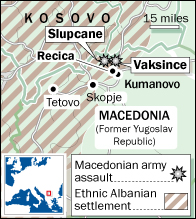 Macedonia close to war against rebels. FROM JOHN PHILLIPS IN RECICA, MACEDONIA
MACEDONIA was considering declaring an official state of war yesterday as government troops continued to exchange fire with ethnic Albanian guerrillas.
European Union foreign ministers urged the Former Yugoslav Republic to hold back from such a declaration and repeated an offer of EU membership as a reward for stability.
Ljubco Georgievski, the Prime Minister, who met President Trajkovski and security officials on Saturday, said: We have discussed this issue (a state of war) very seriously, but first we have to consult other political parties before taking a decision.
The International Committee of the Red Cross expressed concern yesterday about ethnic Albanian guerrillas intimidating civilians to prevent them leaving villages that are being bombarded by government tanks and helicopter gunships. Red Cross workers managed to rescue 13 civilians from the northeastern villages of Slupcane and Vaksince yesterday during a break in firing by Macedonian Armed Forces, but thousands were believed to be trapped in the province of Kumanovo.
Villages there were occupied last week by guerrillas of the National Liberation Army (NLA), who say that they are fighting for the rights of the ethnic Albanian minority in the country, which is dominated by its Slav majority. The rebels actions threaten the country with a civil war that could spill over Macedonias borders.
Artillery fire was heard near the town of Sipkovica, seven miles northwest of the city of Tetovo yesterday, raising fears that the rebels were trying to start a second front. An Interior Ministry spokesman confirmed that there had been an exchange of shots.
Macedonian Slavs and Albanians had co-existed in relative peace until February, when the rebels, who include ethnic Albanians from Macedonia, Kosovo and Albania, began trying to provoke a military crackdown and a conflict between the two communities by attacking government forces.
The Skopje Government, a coalition representing Slav and Albanian Macedonians, has struggled to defeat the rebels without using measures that could be depicted as an attack on the minority community. Officially only two civilians have been killed in the onslaught, but independent Macedonian media estimated the toll to be at least seven civilians and several guerrillas. Macedonian television said that the fighters were parading civilians on tractor trailers during the shelling to force the Macedonian Army to hold its fire. There was no confirmation of the report, but it was indicative of the outrage among Macedonian Slavs.
A short time after a deadline for civilians to leave at midday yesterday, Macedonian gunners resumed their barrage of rebel-held areas.
Macedonian forces lack the troops to capture the villages without inflicting heavy civilian casualties and taking unacceptable losses, so the fighting could be protracted for days, western diplomats said.
The International Committee of the Red Cross is increasingly worried about the precarious situation of hundreds of civilians who remain in these villages, a Red Cross statement said. Annick Bouvier, a spokeswoman, added: We believe people are staying in the villages for a mixture of reasons. A form of intimidation is one of the reasons.
On Friday the Organisation for Security and Co-operation in Europe also said that the guerrillas, many of whom are former members of the Kosovo Liberation Army, were preventing civilians from leaving. Macedonian state television accuses the fighters of using people as human shields.
Mr Georgievski repeated allegations that the insurgency was exported from neighbouring Kosovo. All the information we have shows that these terrorist forces are coming from Kosovo, so there is no doubt it is an aggression from there, he said. Membership in the NATO is extremely necessary for Bulgaria, Washington Times wrote. News.bg In an article devoted to the meeting of Bulgarian Premier Ivan Kostov with American President George Bush published in Washington Times today, the journalist Nicolas Kralev wrote that Bulgaria, after helping NATO in the crucial moment of bombing Serbia during the Kosovo crisis, is proving now that a Bulgarian membership in the NATO is extremely necessary for stability in South Eastern Europe in view of continuing tension in Macedonia, the governmental Information and Public Relations Department reported. The author of the publication reminded that this April Bulgaria agreed to provide permanent access of NATO troops to its territory, and is carrying out negotiations with Washington for disposing pilotless intelligence airplanes at Bulgarian bases. According to Nicolas Kralev, in comparison with Romania that is considered the greatest rival of Bulgaria as for the membership in the NATO, Bulgaria is havig rather impressive economic achievements. Tanker ablaze off Romania. BBC 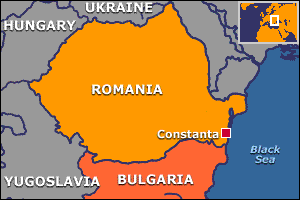 One sailor has died and a second is missing after an explosion on a Bulgarian-registered oil tanker off the Romanian Black Sea coast.
The Romanian coastguard and other witnesses in the port of Constanta, 250 km (155 miles) from the capital, Bucharest, reported hearing a loud explosion shortly after 11am (0800GMT), then seeing plumes of black smoke rising from the ship.
Firefighters are trying to contain the blaze which, it is feared, could spark further explosions. Rescue vessels are searching for the missing crew member.
Most of the 34 people on board the 75,000-tonne capacity Mesta are reported to have been rescued.
The authorites are playing down the risk of an ecological disaster, saying the tanker was cargo-less and carrying only about 500 tons of its own fuel.
The Mesta, built in 1974, had spent the last 10 days anchored outside Constanta waiting to dock for repairs.
Fears
The explosion happened as crew members were cleaning a fuel tank, Romanian naval authorities said.
The cause of the blast has not yet been discovered, but officials fear the fire could spread.
"If the temperature rises near the fuel tank, this ship can become a bomb," said Commander Marin Chintoan Uta who heads the civil navigation authority.
He said although most of the crew members had left the ship, five had remained behind and were "interfering with the extinguishing efforts".
The five were reportedly trying to cash in on a bonus offered by the ship's owners for anyone putting out the fire.
"We cannot start putting out the fire while they are still on board because the high-pressure water cannons would kill them," Mr Uta said. |



